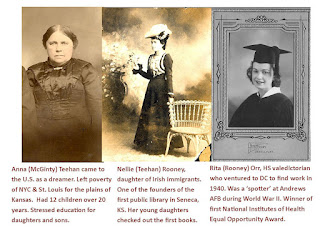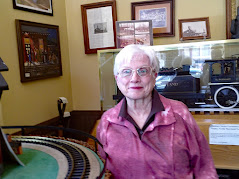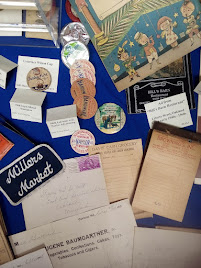By Elaine L. Orr
Blogs (short for web log) have been an important way for people to get their ideas to a large audience. Blogger (Google's blog platform, which hosts my site) began in 1999, a few short years after the concept took form.
If you're wondering why blogs didn't begin until the 1990s, you clearly have always lived in the Internet age. Early users, as I was, first reached the Internet through subscription services such as Prodigy and AOL. They generated content, presented news, and hosted bulletin board topics. You could communicate with other people in almost real time! I used family history and travel bulletin boards. But you only interacted with other subscribers to those platforms.
When direct access to the Internet became easy, blogs became a way to present information and opinions and attract regular readers without being a news columnist or well-known expert. People subscribed to your blog and soon Google's search engine (and now others as well) would lead readers to it.
Those things are still true, but there are lots more communication options today. Facebook lets people follow your posts, which can be short or long. Twitter (now X) has been a wonderful way to present opinion and guide people to longer articles. If it doesn't implode, it still can be, though it's also become ground zero for nasty opinions, so it's not so much fun anymore. I could list other social media options, but you get the point.
Do we still need blogs? Are they worth the effort? I would say they are needed, but you have to refine your content and consistently create posts. Regular can be monthly, but more often keeps readers looking to your posts.
What do I mean by refine your content? If you write a blog that's akin to a memoir or is your take on life, that's fine. Introspection can draw readers, but it won't in and of itself unless you're especially witty or have established yourself as a public figure or influencer. To clarify, bloggers are content creators who develop material to share information. Influencers generally post opinions or sponsor content to earn money and gain popularity.
Generally, a blog would deal with one or closely related topics (as the Irish Roots Author does with writing). You could cover something as broad as international politics, but if that's your topic, don't write about the importance of Thanksgiving Traditions in your family. That won't be why readers open your posts.
As I pondered this topic for today I (naturally) did a Google search on why people write blogs. I found a very good post by Joe Bunting on how to write blog posts. It's an excellent overview, but also tells you the biggest mistake he made when starting (also the biggest mistake he sees most writers making): he cared more about connecting with himself than readers. I've done that, too. Read his article.
You don't need to be an expert to start a blog. You need to have an interest in a topic, be willing to look beyond your own opinions (a.k.a. do some research as needed), and write cogently.
Consider these points before you start a blog.
1) Are you interested enough in a subject to explore it for years?
2) Can you consistently devote time to writing?
3) Can you continue to do something even if you don't get quick gratification?
4) Do you like your topic and writing about it enough to continue even if you don't get comments or a lot of readers?
5) Can you afford to pay for a host or do you need a free site?
Numbers 3 and 4 are related. I don't have a lot of subscribers to Irish Roots Author, but I publicize it on Twitter (now X) and my website, so I attract readers. Some months it's 1,000, others it's 3,000 or more. It's more if someone else refers to my blog on theirs or in an article.
If you look to the right of this post, you'll see links to past years and the number of posts. I fluctuated a lot. The first year I wrote 50+ but many were short and some were notices of special sales for my books. I found my stride and try to write three articles per month and use the posts to convey information. A couple years I averaged a lot less -- I thought I needed to devote substantial time to the posts and I was working on multiple books. Now, I simply tell myself to write three each month and if I'm busy to write something short.
I strongly advise an index, especially if you keep at it. Mine is divided into: Reading, writing, publishing, audiobooks, marketing, and musings. The last subject tells you I break my own rule and sometimes write about what's on my mind other than writing.
A final point. A lot of people link a blog to their website or pay the annual fees to have an exclusive name for the blog and a site to host it. I have a website I pay for, but I used blogger's free version in case (as I age) there comes a time when I don't want to spend at least a couple hundred dollars a year to blog. Thus, my site is named Irish Roots Author but the address is https://elaineorr.blogspot.com.
You want to write a blog? Go for it.
* * * * *
To learn more about Elaine L. Orr, visit her website or sign up for her newsletter


















